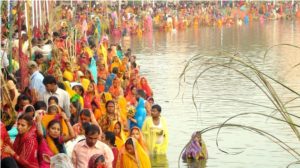Barak UpdatesCultureBreaking News
Chhath Puja begins with traditional fervour

way2barak, Oct.28: Chhath is an ancient Hindu festival that is performed as thanksgiving to Surya – The Sun God for sustaining life on earth and granting Health, Prosperity & Abundance. According to Hindu traditions, the sun god ‘Surya’ is the supreme deity which represents will-power, fame, the eyes, general vitality, courage and kingship. Unlike other Hindu Pujas, which involve idol worship, this festival is dedicated to worshiping a natural phenomenon which is in fact the life force of our planet.


- Chhath Puja Day 1: Nahay-Khay: Friday, 28 October 2022
- Chhath Puja Day 2: Lohanda and Kharna – Saturday, 29 October 2022
- Chhath Puja Day 3: Sandhya Arghya – Sunday, 30 October 2022
- Chhath Puja Day 4: Usha Argh and Paran – Monday, 31 October 2022
लोक आस्था के 4 दिनी महापर्व #छठ_पूजा की आज शुरुआत हो गई है। छठ व्रती कल 'खरना' के साथ निर्जला उपवास शुरू करेंगे। तीसरे दिन अस्ताचलगामी और चौथे दिन उदीयमान सूर्य को अर्घ्य देकर व्रत संपन्न करेंगे।
सूर्य देव एवं छठी मइया आपकी मनोकामना पूरी करें। हार्दिक शुभकामनाएं।🙏#ChhathPuja pic.twitter.com/1598jUMPA5
— Himanta Biswa Sarma (@himantabiswa) October 28, 2022
The meaning of the word Chhath is six Hindi Language and as this festival is celebrated on the sixth day of the month of Karthika, the festival is named the same. Chhath puja is a festival dedicated to the Sun God, Surya and Chhathi Maiya, Usha (wife of Surya).
 It is celebrated during the month of Kartik (October-November) on the sixth day after Diwali mainly in the states of Bihar, Jharkhand, Uttar Pradesh, Orissa and West Bengal. Chhath Puja is also performed in the three districts of Barak Valley. Rituals span over four days and devotees go without food and water. Chhath is mainly characterized by riverside rituals in which Sun God is worshiped, giving it the name of ‘Suryasasthi.’
It is celebrated during the month of Kartik (October-November) on the sixth day after Diwali mainly in the states of Bihar, Jharkhand, Uttar Pradesh, Orissa and West Bengal. Chhath Puja is also performed in the three districts of Barak Valley. Rituals span over four days and devotees go without food and water. Chhath is mainly characterized by riverside rituals in which Sun God is worshiped, giving it the name of ‘Suryasasthi.’
The meaning of the word Chhath is six in Hindi and as this festival is celebrated on the sixth day of the month of Karthika, the festival is named the same. The first day is known as ‘nahai khai’ when devotees take a dip in a river or a pond in the morning and carry home water from the same water body to prepare prasad (offerings). Devotees have only one meal on this day.
 The Second day is known as ‘lohanda’, when women observe fast for the whole day, breaking it only after sunset. After this begins a 36-hour long fast during which they are not even allowed a sip of water. On the fourth day, devotees gather around the same river or pond and offer ‘Usha arghya’ (morning offerings) to the rising sun. It is only after this puja that the worshipers break their fast.
The Second day is known as ‘lohanda’, when women observe fast for the whole day, breaking it only after sunset. After this begins a 36-hour long fast during which they are not even allowed a sip of water. On the fourth day, devotees gather around the same river or pond and offer ‘Usha arghya’ (morning offerings) to the rising sun. It is only after this puja that the worshipers break their fast.





